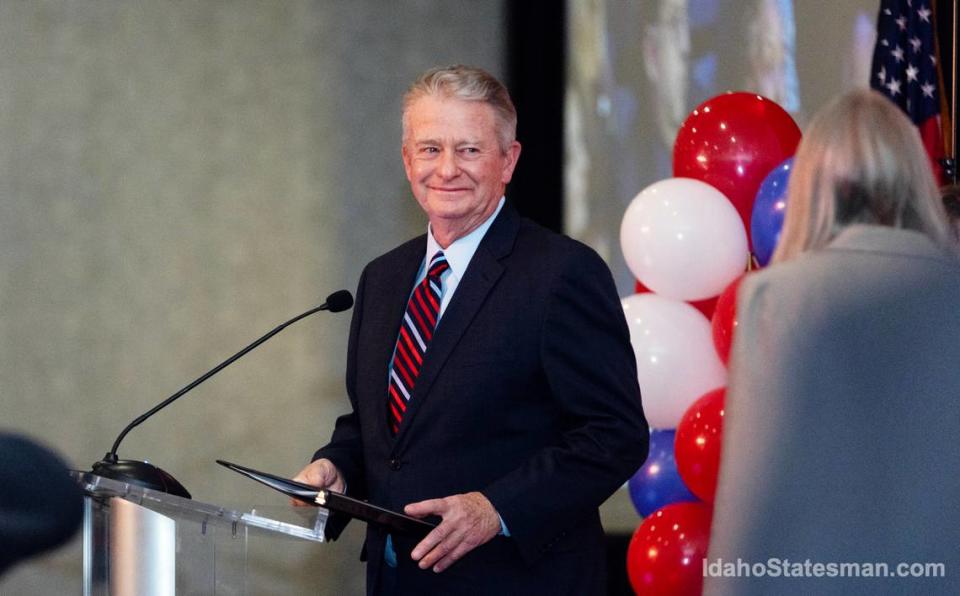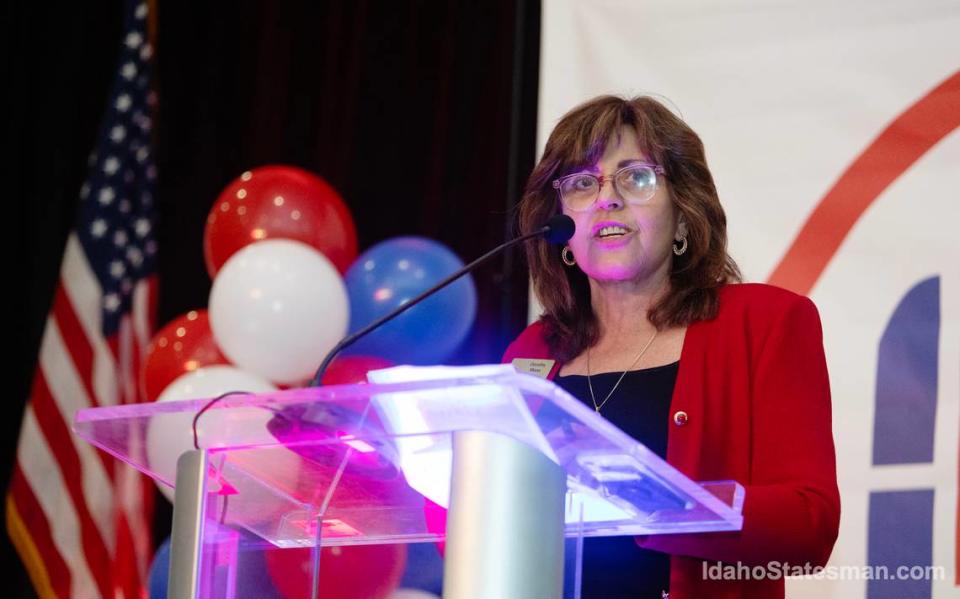‘They do not want our voice’: Idaho GOP OKs less power for women, young Republicans
- Oops!Something went wrong.Please try again later.
The Idaho Republican Party last week denounced more than a dozen GOP officials, including the governor, for rejecting a bill that would have allowed Idahoans to sue their libraries for having books deemed “harmful.”
The “vote of no confidence” was among a handful of rules and resolutions adopted during the annual summer meeting of the State Central Committee. Roughly 200 statewide and local party leaders, from county and legislative district committees, met in Challis to consider new bylaws and resolutions.
The party leaders adopted a new rule allowing central committees — statewide and local governing bodies, similar to boards of directors — to punish elected Republicans who deviate from the GOP platform. They also eliminated voting authority on the party’s executive committee for three groups that represent Republican women and young voters. And GOP leaders endorsed a plan to hold a caucus next year to select a Republican nominee for president.
“The grass-root Republicans have shown they are very supportive of the Idaho GOP’s current trajectory and the direction of the party,” Idaho GOP Chairwoman Dorothy Moon told the Idaho Statesman by email. “We are true to the Republican platform and the Idaho and U.S. constitutions.”
But other party leaders said the new rules will quash dissenting opinions and limit who can wield the party’s authority in elections. The party leaders who met in Challis showed they want “less voices heard in the Republican Party,” said Tracey Wasden, president of the Idaho Republican Women’s Federation.
“There are rules and resolutions out there that want to narrow down voting, that want central committees to say if you’re Republican enough to run or not,” Wasden told the Statesman by phone. “That isn’t the American way. If you want to run for an office, you throw your name in, you run for it and then let the people decide.”
Republicans denounced for library bill opposition
The Idaho GOP last week retaliated against Gov. Brad Little and House Republicans for opposing House Bill 314.
The legislation was the latest attempt by hard-right Idaho lawmakers to limit books available in libraries, part of a nationwide trend that’s focused on opposition to LGBTQ+ content. House Bill 314 would have allowed the guardian of a child who was able to obtain “harmful” material from a library to sue the institution for $2,500. “Sexual conduct,” according to the legislation, included depictions of intercourse, masturbation and homosexuality.
The Idaho GOP last week adopted a “vote of no confidence” for Little, who vetoed the bill after it cleared the Legislature, and the 14 House Republicans who opposed an attempt in March to override the governor’s veto.
Dan Bell, youth committeeman for the Kootenai County Republican Central Committee, authored the resolution. Bell did not respond to a request for comment.
Moon said the central committee voted to reprimand the GOP officials “for their failure to safeguard the well-being of children.”
Madison Hardy, Little’s spokesperson, said the governor “agrees we need to keep harmful materials out of the hands of children,” but he doesn’t want to limit children’s library access “at a time when they need as many resources as possible for reading and learning.”
Hardy also noted the Republican-dominated Legislature has supported the governor’s “Idaho First” plan to support public schools, provide property tax relief and curb illicit drugs.
“Gov. Little vetoed a bill that would have created a bounty system on our libraries and effectively shut down library access to minors,” Hardy said by email. “The bill also would have devastating financial impacts to our rural libraries.”

Rep. Rod Furniss, R-Rigby, one of the 14 legislators denounced in the resolution, tweeted Sunday that House Bill 314 “was well intended to keep pornography out of public and school libraries.” But the bill was “poorly written,” and the potential $2,500 civil penalty would “ruin most libraries,” Furniss said. Furniss did not respond to an interview request from the Statesman.
The State Central Committee also approved resolutions that:
Falsely declared that COVID-19 vaccines are biological and technological weapons;
Called for an investigation into the Idaho Department of Health and Welfare’s promotion of COVID-19 vaccines and urged the Legislature to reduce the department’s funding;
Reiterated the party’s support for Idaho’s abortion ban and urged the Legislature to pursue programs that assist “in the care and protection of mothers and babies”;
Called for Idaho’s bipartisan redistricting commission to be disbanded, after claiming that such commissions were created to help establish advantages for Democrats.
GOP plans to hold presidential primary caucus
Republicans also endorsed a plan to hold a March caucus to select a presidential nominee, after a bill from last legislative session included a technical error that eliminated the primary.
Previously, Idaho held its presidential primary in March and all other primary elections in May. House Bill 138 moved the presidential primary to May, an attempt to consolidate the primary elections and save taxpayers about $2.7 million in costs associated with a separate election.
But the bill neglected a mechanism allowing candidates to file for the election, which inadvertently eliminated the presidential primary altogether. A trailer bill, Senate Bill 1186, sought to fix the error, but the legislation failed in the House.
Lawmakers could reconvene to fix the law before next year’s primary, or leave it up to political parties to come up with their own nomination process.
“There’s been lots of conversations trying to figure out solutions,” Idaho Secretary of State Phil McGrane told the Statesman by phone. “I think there, unfortunately, is a fundamental disagreement between the party and the Legislature on the timing.”
Moon lobbied against moving the primary to May during the legislative session. An earlier nomination process compels candidates to focus their time and resources on Idaho, Moon told the Statesman.
“A later primary date would mean that candidates won’t bother to show up in Idaho at all, as they focus on states that vote earlier and, because of their size, have more delegates to offer,” she said. “A May presidential primary means Idaho’s voice is drowned out by the decisions made in earlier primary states, leaving Idaho, and our Republican voters, irrelevant in a national nominating process.”
While the state funds and oversees primary elections, political parties bear the cost and responsibility of a caucus. Caucuses cost less — no printed ballots are required — but the time it takes to participate in a caucus leads to reduced voter participation. Voters must attend a caucus in person on a specific date, which means they can’t vote early or submit an absentee ballot.
“When you have a caucus, you hear less voices, and that is what some people in this party want,” Wasden said. “They want less voices heard, so their voice has more impact.”
McGrane said he and other state leaders would prefer a solution that maintains a ballot election, but national party deadlines are approaching. Republican National Committee rules dictate that changes to primary election dates must be finalized by Oct. 1.
“I really want to have the opportunity to vote, and I think that’s what we hear from the public as well,” McGrane said.
Elected Republicans face censure for defying platform
The GOP party leaders also adopted a new rule allowing central committees to censure elected Republicans who stray from the party line.
The new rule empowers statewide, county and legislative district committees to summon an elected official to answer for “substantive violations of party platform or constitutions.” After a second violation, a committee can vote to withdraw party support for the official and bar them from using GOP identifiers on campaign material.
“The rule allows committees to ensure the accountability of elected representatives to the Idaho Republican platform,” Moon said. “In more extreme cases, these committees can impose restrictions on the representative’s eligibility to run under the Republican name.”
Linda Yergler, chairwoman of the Shoshone County Republican Central Committee, co-authored the platform enforcement rule. She also crafted a new rule that eliminated state executive committee voting privileges for leaders of the Idaho Republican Women’s Federation, Young Republicans and College Young Republicans. Reached by phone, Yergler declined to comment.
The state executive committee, which includes the state chair, vice chairs and other top party leaders, is responsible for administering party policy and programs. Representatives from the three groups will remain on the committee but can no longer vote on executive decisions.
Wasden, who has been president of the Republican Women’s Federation for nearly a year, said her opposition to the primary caucus prompted her demotion. The Women’s Federation has 700 members who run campaign offices, raise funds, work at the polls and raise children on Republican values, Wasden said.
“We are the workers in this party,” Wasden said. “They do not want our voice at this time because our voice may be different than the other voices on that committee that they want to control.”
Moon said it’s “absurd” to say the voices of women and youth have been eliminated in the party.
“It is notable that the state central committee has 44 committeewomen, many female county and legislative district chairs, 44 youth committeepersons, and as you know, I am a woman and was elected chair of the state party,” she said.


